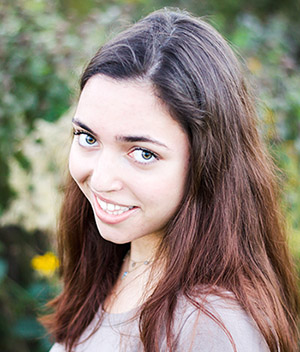
Leora Eisenberg
Students who are learning about the Holocaust have probably heard a lot about antisemitism as it manifested itself in Europe in the 1930s and ‘40s. What they might not realize, however, is that antisemitism still affects students just like them today, right here in America.
That’s what Echoes and Reflections’ new lesson Contemporary Antisemitism hopes to teach them with its inclusion of a short profile of Leora Eisenberg, currently a freshman at Princeton University, who blogged about her own brush with anti-Semitism last year on the Jerusalem Post.
In her blog, Eisenberg described how she was almost unable to attend a lecture by a visiting Israeli professor at the University of Minnesota because of a group of BDS protestors blocking her way into the lecture hall. Once she made it inside, the lecture itself was interrupted and drowned out by the protesters’ shouting, making it impossible for her and the other students to learn.
“Their protest in the name of “free speech” went against the free marketplace of ideas that an educational institution should stand for and seek to enshrine,” Eisenberg wrote. She went on to say, “By screaming and yelling for a solid forty minutes, they [the protesters] prevented any intellectual exchange ... their belief in “human rights” applied only to a certain group of humans, because, clearly, the pro- Israel humans at the University of Minnesota had no right to free speech or security.”
Eisenberg said Echoes and Reflections Project Director Deborah Batiste contacted her and asked to speak with her about the incident so that Eisenberg’s experience could be included in the new lesson. Eisenberg said she was very excited that her experience would be used to teach students about contemporary antisemitism.
“When I get to talk about antisemitism I get really excited because it’s brushed aside so often and when I see people educating others about it I’m willing to do just about anything to help,” she said.
Eisenberg said she hopes her story teaches students what antisemitism actually looks like, and encourages them to become advocates against it.
“I’m happy my story is being told because young people need to know what’s actually going on and they need to prepare themselves for it, and the earlier they can start the better,” Eisenberg said. “Forewarned is forearmed and empowered is the best way to go.”
Many young people, including Jews, have trouble calling out antisemitism when they see it, Eisenberg said. For example, she hopes they learn to recognize when criticism of Israel is acceptable, and at what point it becomes something much different.
“Once kids know my story they’ll be able and more empowered to do the research and call it out for what it is: It’s antisemitism,” she said. “And [they can] educate others about it.”